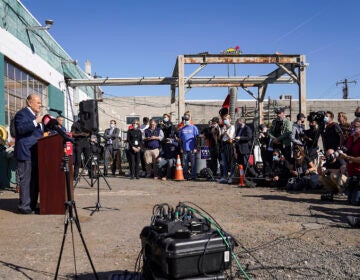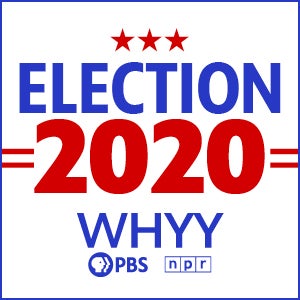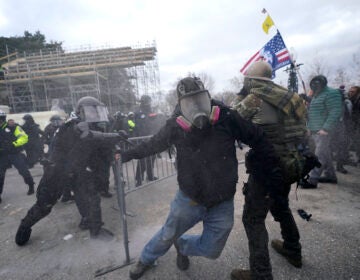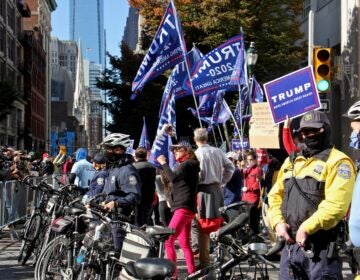Trump’s Four Seasons Total Landscaping bill: On the house
President Trump’s campaign filings list more than 100 payments for facility rentals – but none to the Philadelphia company that hosted his most memorable press conference
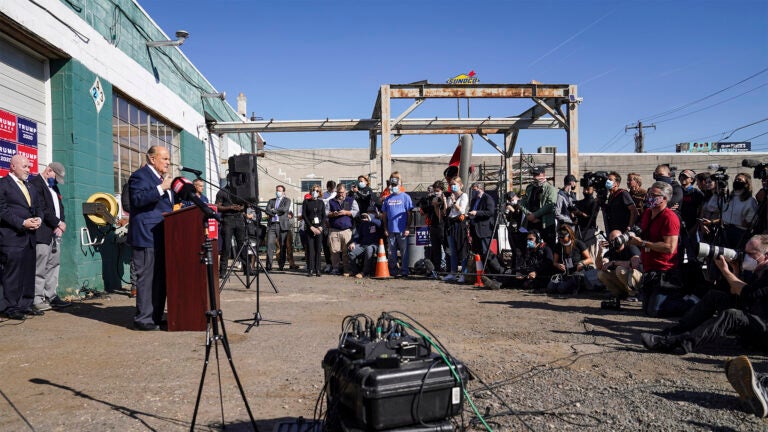
Former New York mayor Rudy Giuliani speaks during the news conference in the parking lot of Four Seasons Total Landscaping. (John Minchillo/AP Photo)
This story originally appeared on NBC10.
The internet’s favorite post-election moment from President Trump’s re-election campaign appears to have come with a price tag lighter than a bag of leaves: free.
An NBCLX review of the president’s post-election campaign filings, submitted to the Federal Election Commission Thursday night, revealed no payment to Four Seasons Total Landscaping in Philadelphia, the site of a November press conference that went viral – not for the disproven allegations Trump attorney Rudy Giuliani lobbed – but for the venue itself: a nondescript parking lot, next to an adult book store and across the street from a crematorium.
NBCLX reviewed expenses reported by the Trump campaign from Oct. 15 through Nov. 23, as well as those from the president’s political action committee (PAC), “Trump Victory,” and his new leadership PAC, “Save America.” There were no payments made to Four Seasons Total Landscaping and no payments to – or contributions from – the company’s owner, Marie Siravo.
On Saturday morning, Nov. 7, with the 2020 election about to called for his opponent, President Trump tweeted, “Lawyers Press Conference at Four Seasons, Philadelphia. 11:00 A.M.” But with no press conference scheduled at the Four Seasons Hotel in Philadelphia, the president quickly deleted his tweet and replace it with one clarifying the event would actually be held at “Four Seasons Total Landscaping” instead. However, the die was cast, and the bizarre event was widely-mocked around the globe.
Campaigns are required to pay fair value for any resource used while seeking office. More than 100 other facility fees were listed in the president’s campaign report, including some as small as $250 to rent out the Cavalry Chapel of Bangor (Maine) and $300 for use of Aw Shucks Farms in Monroe, N.C.
Most of the campaign’s facility rental fees were in the $2,000 to $8,000 range.
“A campaign must pay a business fair market value for the use of its facilities,” said Brendan Fischer, Director of Federal Reform for the Campaign Legal Center, a nonpartisan good-government group that watchdogs money’s influence in politics. “But calculating the fair market value here could be a bit of a challenge, because I suspect that Four Seasons Total Landscaping does not regularly rent out its parking lot for press conferences.”
If the campaign determined there was no market value for use of the property, it would not have to report it.
“The cost of the space rental would certainly be much higher if Trump’s legal team had used space in the Four Seasons hotel for the press conference rather than the Four Seasons Total Landscaping parking lot,” Fischer added.
By comparison, facility rentals at a luxury hotel typically run in the thousands – if not tens of thousands – of dollars. The Trump Victory Committee, a political action committee affiliated with the president’s official campaign, reported paying the Four Seasons $124,000 for “facility rental/catering services” from August to October.
The Trump campaign has also reported spending hundreds of thousands of dollars at Trump Hotels for “facility rental/catering services,” including at least five payments that did not include catering in the last 13 months; those facility rental fees ranged from $1,605 to $50,739.
It is possible Philadelphia’s most-famous landscaping company was compensated through one of the campaign’s “event staging” vendors, but that does not appear to be how the Trump campaign typically reports its venue fees. It is also possible the company has yet to be compensated for its facility use, but it was not listed on the campaign’s list of outstanding debts, according to its Thursday night filing.
Elections law experts say outside groups are not allowed to pay for expenditures like a campaign press conference.
“If Giuliani was representing that he was doing this on behalf of the Trump campaign, the expenses related to that would be considered a campaign expense,” said Ciara Torres-Spelliscy, an elections law professor at Stetson University. “Because it is part of the election and the litigation around the election.”
Four Seasons Total Landscaping may not have commanded five-star facility fees, but business has bloomed nonetheless following its viral moment, with more than a million dollars of “Make America Rake Again” and “Lawn and Order” merchandise reportedly flying off the shelves. The company even created a line of branded ugly Christmas sweaters.
The president’s campaign reported spending $208 million in the reporting period from Oct. 15 to Nov. 23, a torrid pace that left it scrambling for cash after the election, according to its FEC filings. But the campaign and RNC raised $207.5 million after Election Day, according to FOX News, through an aggressive “Official Election Defense Fund” fundraising effort, which asks for donations in the name of contesting the election.
However, fine print in fundraising solicitations details that much of the money raised is actually earmarked to first pay down campaign debt. Donors need to give at least $5,000, according to the New York Times, before a single penny goes to recount and legal efforts, with the campaign, a new pro-Trump PAC, and the Republican National Committee benefiting instead.
“Trump’s fundraising appeals have been incredibly misleading,” said Fischer, who has been documenting the campaign’s debt pay-down on Twitter. “The average donor who gave to Trump’s so-called ‘election defense fund’ were not financing his post-election legal fees at all. Small donors who gave to Trump thinking they were helping to ‘stop the steal’ have in fact helped pay off Trump’s campaign debt and funded his post-White House political operation.”
The new PAC, “Save America,” is classified as a leadership PAC, which under federal law, has fewer restrictions on how it spends donations than Trump’s other campaign accounts. While converting donor dollars to personal use is prohibited from the primary campaign account, it is generally permitted from the leadership PAC.
“It seems like a dishonest grift to take money that donors think is going to a legal defense and then put that money into campaign coffers for a future election,” Torres-Spelliscy added.
But running up debt in the final days of a campaign is not unusual, she said. Both the Biden and Trump campaigns spent hundreds of millions of dollars in the final days of the 2020 campaign. The Biden campaign reported just $1.6 million cash on-hand in its post-election report.
“After Hillary Clinton’s loss in 2008, she had an enormous amount of campaign debt. It took her years to retire it because…you have to abide by the same hard money limits (as the general election) and you have to do it in these small chunks.”
In 2020, an individual donor can only give a campaign $2,800 for the general election, so the Trump campaign has needed to find new donors post-election to help pay off outstanding debt. Failing to pay down large chunks of debt puts candidates in ethical gray areas, Torres-Spelliscy added, since the value of forgiven debt would exceed federal contribution limits.
Neither the Trump campaign nor Four Seasons Total Landscaping answered NBCLX’ request for interviews this week, but after the story was posted, the official FSTL Twitter account shared it with the tweet, “Pro Tip: When diversifying business offerings, you may suffer some losses at the start up.”
WHYY is your source for fact-based, in-depth journalism and information. As a nonprofit organization, we rely on financial support from readers like you. Please give today.


